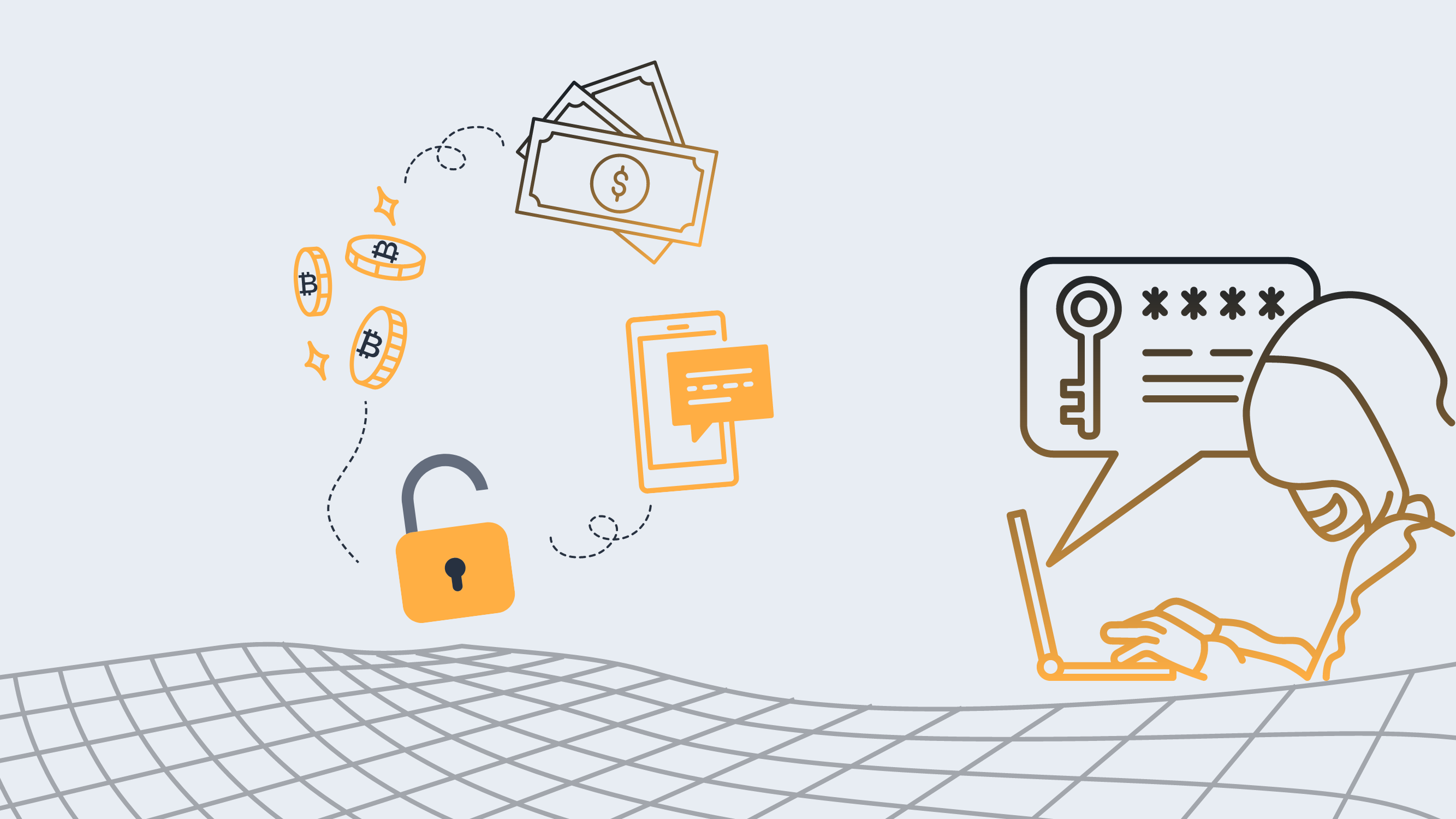Spotting Crypto Scams (and Avoiding Them)

As crypto adoption grows, crypto scams are an unfortunate side effect. The blockchain is a powerful and disruptive technology that has the potential to transform many people’s lives. But as the old saying goes, every coin has two sides. There are fraudsters who are looking to take advantage of crypto newcomers.
Learning about the most prevalent types of crypto scams is the first step to avoid becoming a victim.
What is a crypto scammer?
Scammers are creative and persistent. With just a few bits of personal information, a scammer can impersonate you or someone in your network. Most crypto scams rely on some kind of deception — fake websites, phony online profiles, convincing impersonations, blackmail, extortion … these are only a few of the methods scammers use to create a bitcoin investment scam or another type of cryptocurrency investment scam.
Watch out for these crypto scams
These are some of the most common crypto scams that investors should be aware of:
1. Romance scams
The internet brings people together from all corners of the globe, and websites and apps dedicated to matchmaking have been successful for decades. Some crypto scammers use these dating services with malicious intent, posing as a potential love interest so they can lure victims into a fraudulent investment scheme or simply ask them for a personal loan. For example, scammers may claim they need the funds to purchase property or a plane ticket to visit you. Once the funds are sent, the would-be partner disappears.
Whenever a potential love interest asks for crypto, and especially if they make this a crucial condition for taking the online relationship to the next level, it’s time to do a serious reevaluation of this relationship. Crypto newcomers can avoid becoming crypto romance scam victims if they remain vigilant for common warning signs like frequent monetary issues and increasing requests for assistance.
2. Investment scams
Have you received an unsolicited message from someone claiming to have financial advice that is “very lucrative” or an investment strategy that will “change your life forever?” These are age-old bitcoin scams. The story usually begins the same way, with a fraudulent investment manager claiming to have a life-changing crypto investing strategy … but the only way to access it is to sign up for an account with them or giving them funds for an initial investment. These scams often convey a sense of urgency but once the crypto has been transferred, the so-called expert and the crypto you sent to them are gone. It is safest to perform your own research and manage your investments yourself. You should never invest with someone who reaches out to you through social media.
3. Phishing scams
Phishing is a familiar concept currently being employed by crypto scammers. It occurs when a fraudster poses as a trusted source (like a bank) and attempts to collect personal information — such as a name, address, phone number, social security number, passwords, and so on — to gain access to sensitive accounts. In this case, a phishing scam will try to get access to your cryptocurrency by asking for information that provides access to users’ crypto wallets. Sometimes this is done through a webpage that cleverly mimics a trusted company. It’s critical to safeguard personal information like the examples listed above and NEVER share passwords with anyone.
4. Impersonation Scam
A scammer may also pose as a government official to separate people from their crypto. An impersonation scam may involve someone pretending to be an IRS official or a representative from another government agency. Scammers can also impersonate someone working for a utility company and ask for crypto to pay outstanding fees for something like a late electricity bill or water bill.
Keep in mind that no U.S. government agency accepts cryptocurrency payments at this time– any request to pay an outstanding bill or fee in cryptocurrency is likely a scam. Always call the issuer of the bill or fee using the phone number found on their website to verify the charge is real before paying it.
5. Social media giveaway scams
The social media giveaway scam has risen in popularity with the mass adoption of social platforms like Twitter, Instagram, TikTok, and Facebook. The scam takes the form of a post that promises free crypto or a similar prize with monetary value behind it. The scammers frequently pose as celebrities like Elon Musk and claim they have lots of cash to give to their first crop of new followers, but then vanish without a trace.
Even if a social media giveaway looks legitimate, remember one of the top methods to avoid crypto scams: never send crypto to somebody you don’t personally know, and never share crypto wallet details with another person — even if it’s a well-known celebrity.
6. The crypto job scammer
The crypto industry has gone on a hiring spree in recent years. Many blue-chip firms in finance, consulting, and technology have built entire crypto divisions seemingly overnight. All this fast growth has the unfortunate side effect of luring scammers into the mix.
A scammer might pose as a recruiter in this rapidly growing industry. If the recruiter requires upfront payment for you to get the job, that’s a red flag. No legitimate job offering will ask for payment to be considered for the role! Stay vigilant against crypto scammers who are posing as job recruiters in hot industries like DeFi.
Common warning signs of crypto scams
A general rule to keep in mind is to ask yourself, “Does this seem too good to be true?” If the answer is “yes,” then it’s likely a scam. It might be useful to set strict boundaries for yourself if you’re new to crypto. This could be a hard-and-fast rule like never sending crypto to anybody that you haven’t met in real life.
Any crypto investment expert or potential romantic partner asking for personal information should also raise alarm bells.
And, in general, anyone claiming to be giving away free crypto or free money is probably not being truthful. There are some examples of legitimate crypto giveaways, but any individuals or companies that are honestly trying to give away crypto must prominently outline clear rules and guidelines.
Things seen on a screen can seem real, but it’s best practice to heavily scrutinize any claims that sound like the examples above. Setting things in a real-life context can be helpful. If a person stopped you on the street and claimed that you could get 10x your money by simply giving them $10, do you hand them $10 from your wallet? The answer is probably no. Take this same amount of healthy skepticism to the online realm. It could make the difference between falling for a crypto scam and keeping your crypto safe.
If you have any questions or feel you may have been targeted in a scamming or phishing attempt, please contact us immediately at our 24/7 support number: 877-757-2646.



